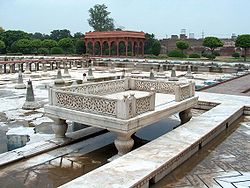Mian family of Baghbanpura

The Mian Arain family of Baghbanpura is an aristocratic noble family of Lahore, Pakistan.[1]
Belonging to the Arain tribe of Punjab region, The family have great contribution in the region and owned the land near Baghbanpura on which the Shalimar Gardens were built. The land was handed to the Mughal Emperor, Shah Jahan and in return custodianship of the Shalimar Gardens was granted to the family in 1641.[2] The Mian family ceased to be custodians of the site in 1962, after the imposition of martial law in Pakistan by General Muhammad Ayub Khan.[citation needed]
Descendants of the Baghbanpura family now live in new localities of Lahore but still own land in urban area and the family has its own graveyard in Baghbanpura.[citation needed]
Notable family members[]
- Mian Muhammad Yusaf Manga, was noble Zamindar who was appointed custodian of the famed Shalimar Gardens, Lahore by Mughals, and also received the title of 'Mian' from Mughal emperor Shah Jahan)[3]
- Mian Qadir Baksh, poetical name being Nadir, Chief Engineer Artillery in Ranjit Singh's army. [4]
- Justice Mian Shah Din (1868–1918)[5] – Muslim judge in British India, poet and writer.
- Sir Mian Mohammad Shafi (1869–1932) – Member Viceroy's Executive Council.
- Mian Sir Muhammad Shah Nawaz[6] – A politician of Punjab in the 1920s.
- Justice Sir Mian Abdul Rashid – first Chief Justice of Pakistan (1947).
- Mian Iftikharuddin – Politician, owner of Pakistan Times and Daily Imroz
- Mian Muhammad Rafi – Secretary to the Government of India until Partition.
- Jahanara Shahnawaz (1896-1979) - Politician and Muslim League activist.[7]
- Mumtaz Shahnawaz (1912-1948) - Political activist and author, who died in a plane crash at the age of 35 en-route to represent Pakistan at the UN General Assembly, the first woman in Asia to preside over a legislative session.
References[]
- ^ The Garrison State: Military, Government and Society in Colonial Punjab, 1849-1947 by Tan Tai Yong pg.263
- ^ Gilmartin, David (1988). Islam & Empire. University of California press. p. 90-91. ISBN 978-0520062498.
- ^ Shalamar Bagh, World Heritage Series published by UNESCO
- ^ David Gilmartin: Empire and Islam: Punjab and the making of Pakistan. University of California, 1988
- ^ Justice Shah Din: A Biography by Bashir Ahmad – Pub. 1962
- ^ The Garrison State: Military, Government and Society in Colonial Punjab, 1849-1947 by Tan Tai Yong pg.263
- ^ Muneeza Shamsie (11 July 2015). And the World Changed: Contemporary Stories by Pakistani Women. Feminist Press at The City University of New York. pp. 5–. ISBN 978-1-55861-931-9.
- History of Punjab
- History of Pakistan
- Pakistani noble families
- Mian family